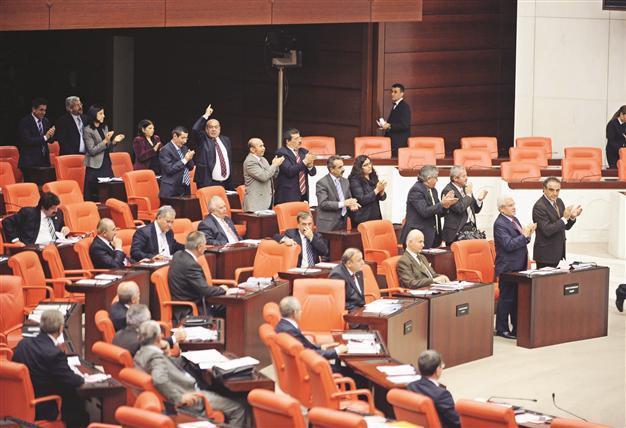Speaker exerting effort to prevent crises
ANKARA - Hürriyet Daily News

This file photo shows BDP deputies in Parliament. BDP leader Selahattin Demirtaş and DTK co-chairs Ahmet Türk and Aysel Tuğluk all have pending cases. DAILY NEWS photo, Selahattin SÖNMEZ
In the closed doors meeting of the Constitution Conciliation Commission, Parliamentary Speaker Cemil Çiçek has demonstrated a stance that the public has not witnessed up until today. The topic is arrested deputies and concerns the situation of independent deputies and Peace and Democracy Party (BDP) deputies, whose cases are similar to Kemal Aktaş’s, in which a sentence has been approved or is expected to be approved by the Supreme Court of Appeals.In response to deputies who referred to this situation in the meeting, Çiçek said: “I am the one who is annoyed, who is sorry because of this situation. Don’t assume that nothing is being done. Not everything is done publicly. I am conducting some work, as well as meetings and contacts on the subject.”
Commission members, naturally, asked Çiçek to elaborate on his contacts. Çiçek replied, “I cannot, otherwise in five minutes it will become breaking news on TV.”
What are those secret contacts? What is Çiçek trying to do? I wandered around the corridors and my impression is that Çiçek is, on one hand, trying to stop the withdrawal of the status of the independent deputies and, on the other hand, is trying to prevent an image similar to when the Democracy Party (DEP) deputies were forcibly detained at the door of Parliament in 1994. Çiçek is fighting to save the prestige of Parliament both at a national and international level.
Why is he doing that? With this approach Çiçek is trying to prevent a possible polarization during the process to write a new constitution. Kemal Aktaş’s sentence was approved by the Supreme Court of Appeals. But there are other cases at the Supreme Court of Appeals that are expected to be approved regarding figures who are seen as leaders of Kurdish society, such as BDP leader Selahattin Demirtaş and Democratic Society Congress (DTK) co-chairs Ahmet Türk and Aysel Tuğluk. If the sentences of these figures are approved by the high court and the final verdict is sent to Parliament, then they may be stripped of their deputy status. This situation may create consequences that may threaten both the writing of the new constitution and domestic peace in the region. Çiçek must be seeing this, as he is trying both to create a healthy environment in which to write the constitution and prevent a possible regional clash.
It is being said that in order to rule out the possible risk, Çiçek is conducting top-level contacts. A few options are being mentioned. Among them is the new justice package that is expected to be sent to Parliament soon. Another one is to create a formula in Parliament to prevent deputies whose sentences have been approved at the high court from having their status as deputies being revoked. The formula suggested by the head of the Constitution Commission, Burhan Kuzu, is also on the table. Kuzu has drawn attention to the contradiction between articles 83 and 84 of the Constitution and says the cases should be postponed until the end of the term, emphasizing that penal provisions need to be applied in favor of the defendant.
Unless there is an extraordinary change, there are increasingly strong signals that a political preference in light of these options will be on the agenda in the coming term. If this is finalized, then the writing of the new constitution’s content will start in an atmosphere without fighting. Çiçek is making an effort to create this picture before the writing of the content as he tries to prevent the new constitution from falling victim to a crisis.
What is the true goal of probes into the past coups?
The Justice and Development Party (AKP) has pushed the button for all coups d’états in Turkey to be investigated by Parliament. The decision was made by the Central Executive Board (MYK) of the AKP with Prime Minister Erdoðan’s approval, and the party’s parliamentary group is continuing preparations on this topic. Unless they make a last minute change, a motion will be entered on the anniversary of the March 12 (1971 coup) for the investigation of coups by Parliament. The targets are said to be the investigation of the coup processes of May 27, 1960; the March 12, 1971 memorandum; the Sept. 12, 1980 coup, and the February 28 “postmodern” coup. It is whispered in the corridors that the AKP wants to focus on discussing February 28 in particular. One influential party member believes that this process will form the infrastructure to keep the grassroots alive, for practices to be introduced next term. On the other hand, the opposition has said: “The AKP targets revenge with arrangements such as the 12-year tiered education changes. They intend to keep the February 28 era alive by means of the parliamentary research commission.”
German visit for solidarity
The German Federal Parliament has formed a commission regarding the long duration of detentions and arrested deputies in Turkey. The commission, which has eight deputies, will visit Turkey next month and meet arrested deputies to demonstrate solidarity. The delegation will visit Mustafa Balbay, Mehmet Haberal and Engin Alan at Silivri prison, near Istanbul. If they have the opportunity, they will also visit BDP and independent arrested deputies. The German deputies also want to meet leaders of the main political parties and the Speaker of Parliament Cemil Çiçek. They have also asked for an appointment from Republican People’s Party (CHP) leader Kemal Kılıçdaroğlu.











